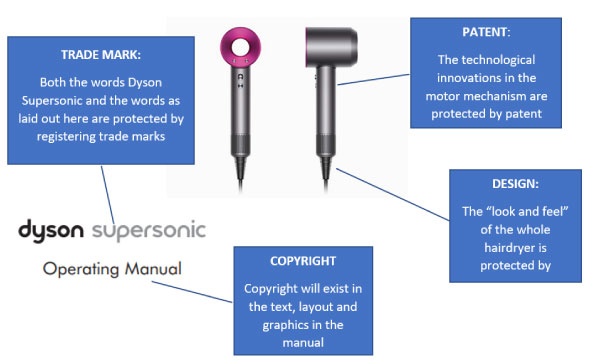
Are your ideas and intellectual property protected?
In our ever-changing world we’re bombarded by brands and their imagery, noises and inventions, much of which has significant commercial value to the owners. Think of Apple’s apple logo, the Dyson Supersonic hairdryer, Tesla’s new electric car and McDonalds’ jingle “I’m Lovin’ It”. How does the law protect the rights of those who write catchy lyrics, come up with new brands or develop the next generation of electric cars?
Request a call back to discuss your issue with an expert solicitor
To encourage scientists, innovators, artists and entrepreneurs to develop their ideas and invest in their creations the law now recognises certain rights of ownership commonly described as intellectual property rights. These rights enable people and businesses to protect the commercial value in their creations, usually for a limited period of time. So, although there is no recognised ownership in an “idea” as such, the law does recognise limited rights of ownership in the way that an idea is expressed. For example, the concept of the vacuum cleaner is no longer capable of protection under the law – Hubert Cecil Booth having invented the first such machine in 1901 – but Sir James Dyson can use intellectual property rights to protect the unique features of his range of vacuum cleaners and other household appliances. Those rights work so as to prevent others from using or exploiting the technology which has cost Sir James many millions in the course of research and development.
The four most common types of intellectual property rights are: patents, trade marks, designs and copyright. However, intellectual property rights can also exist in confidential information, including know-how, business names, domain names, trade dress and goodwill. Rights can overlap and co-exist in the same products and services and may arise either automatically or through a process of registration.
Understanding the value of your intellectual property rights and developing a strategic portfolio enhances the value of your brands and the products and/or services associated with those brands. It can also help prevent unfair competition from competitors and protect the investments made in the research and development phases of bringing products to market.
To understand the power of intellectual property rights let’s take the Dyson Supersonic™ as an example and look at the protectable rights in this hairdryer:

Trade marks
Trade marks are primarily a badge of origin, used to distinguish goods or services of one business from those of one another. Once granted, the trade mark is a monopoly right and can last indefinitely (subject to use and renewal requirements).
Trade marks in the UK can only be acquired by registration. They must be distinctive: marks which simply describe a product will struggle to be registered and will have limited protection.
As you would expect, the Dyson name is now a registered trade mark and each time a new product is launched the name of the product is also registered, in this case “Dyson Supersonic”. Others include “Dyson V7 Trigger”, “Dyson Pure Hot + Cool” and “Dyson Light Ball”.
Copyright
Copyright law protects the expression of an idea, including literary, dramatic, musical and artistic works; and sound recordings, films, broadcasts and typographical arrangements. It usually endures for the duration of the author’s life plus 70 years.
In the UK, copyright arises automatically: you do not need to register your work in order to gain protection. Copyright arises in the creator of the work and a business which commissions a work from a contractor or third party must also ensure the creator explicitly assigns the copyright to it. Works which are created during the normal course of employment are usually assigned to the employer by way of a clause in the employee’s employment contract.
For manufacturers such as Dyson, copyright law will protect the content of each product’s operating manual which includes the text, how the manual is set out and any graphics or photos of the product.
Patent
A patent protects inventions, for example: mechanical devices, pharmaceutical products, methods for doing things and mixtures of compounds. It creates a strong monopoly right and lasts for 20 years, subject to renewal fees.
A patent arises only by registration and must be:
- new (inventions must be kept secret or a patent application will fail);
- involve an inventive step; and
- be capable of industrial application.
Dyson will have registered patents for each of its products to protect the technological innovations found in those products. In this way, Dyson hopes to be able to stop, or at least slow down, copycat competitors from bringing inferior copies of the product to market.
Designs
There are two types of protection for designs, registered design and unregistered design rights.
A “design right” protects the appearance of a 2D or 3D product: lines, contours, shape, colour. It can protect wallpaper patterns, children’s suitcases, clothes, etc.
The design must not have been disclosed in public prior to registration, must not be identical to a design already registered and must have “individual character”.
Unregistered design right will arise automatically in the UK and will give protection for up to 15 years from when it was first created or 10 years from when it was first sold, whichever is earliest.
Protection for a “registered design” can last up to 25 years, provided the renewal fees are paid every 5 years, and will provide stronger, more reliable protection than an unregistered right.
As noted above, the design rights in each Dyson product will be registered in order to prevent infringement by others seeking to exploit the modern, some say futuristic, look of the product. Being able to protect its design rights is very important to the commercial success of Dyson; without protection it would be vulnerable to imitators stealing the designs and manufacturing cheaper imitations.
How we can help
If you would like to learn more about the intellectual property which you may have in your business, or would like to explore how your intellectual property can be protected, then please contact our corporate team to see how we can help you. We can help you register IP rights and provide advice on how best to protect your copyright and other unregistered rights. We can also help you with licensing your IP rights.
Talk to us about
Related services





 Download PDF
Download PDF










